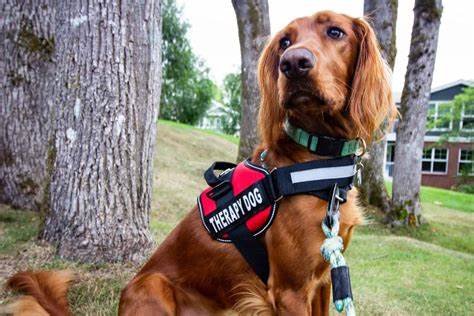The Role of Therapy Dogs in Mental Health
Therapy dogs have proven to be invaluable in improving mental health and emotional well-being. These specially trained animals provide comfort and support to people struggling with various mental health conditions such as anxiety, depression, PTSD, and stress. Their presence in hospitals, nursing homes, schools, and therapy sessions helps reduce feelings of isolation and encourages relaxation through physical touch, such as petting and cuddling.
How Therapy Dogs Help in Mental Health
The role of therapy dogs goes beyond offering companionship. They are trained to understand human emotions and respond accordingly. Their presence helps lower stress hormones like cortisol and increases the production of oxytocin, the “feel-good” hormone. These physiological changes are linked to improved moods and a decrease in anxiety levels.
Studies show that interacting with therapy dogs can help people manage symptoms of anxiety and depression. For example, when people stroke or cuddle a dog, their heart rate slows, and their blood pressure drops, creating a calm environment for emotional healing. Therapy dogs provide a source of unconditional love, which helps clients feel safe, comforted, and supported during difficult times.
Therapy Dogs in Mental Health Therapy
In therapy settings, trained dogs can enhance the therapeutic process. During sessions, therapists may invite therapy dogs to help patients open up about their feelings. Some patients may find it easier to talk to a dog than a human, as the dog’s nonjudgmental and accepting nature encourages openness. Moreover, therapy dogs are often used in group therapy settings to create a calm and relaxed atmosphere, allowing patients to feel more comfortable interacting with others.

Therapy Dogs in Post-Traumatic Stress Disorder (PTSD)
For individuals suffering from PTSD, therapy dogs can play a vital role in helping them manage their symptoms. Dogs have been shown to provide emotional stability and serve as grounding tools when someone experiences a flashback or feels overwhelmed. The dog’s presence can offer comfort and act as a distraction from troubling thoughts, ultimately reducing the intensity of PTSD symptoms.
Therapy Dogs for Children and Adolescents
Children and adolescents facing mental health struggles benefit greatly from therapy dogs. These animals help younger patients cope with emotional issues, such as bullying, trauma, or family problems. The calming presence of a dog can be particularly effective in treating children with anxiety or autism. Dogs help children feel more secure, and their playful nature makes them great companions for children who need emotional support.
Training and Certification of Therapy Dogs
Therapy dogs are different from service dogs. While both types of dogs are trained to provide assistance, therapy dogs work under the guidance of professionals to offer comfort and support to people in various settings. Therapy dog training focuses on teaching dogs to interact calmly with people in diverse environments, such as hospitals, schools, and nursing homes. Certification programs ensure that therapy dogs meet the necessary behavioral standards to interact appropriately with different individuals.
The Growing Importance of Therapy Dogs
As mental health awareness increases, the role of therapy dogs has become more recognized in the medical and mental health fields. Many organizations and healthcare facilities now integrate therapy dog programs into their treatment offerings, acknowledging the positive impact these animals have on their patients’ well-being.
Incorporating therapy dogs into mental health care provides an alternative, non-invasive way to improve mental health, offering a natural and accessible option for those in need. Their presence in therapeutic environments helps foster emotional healing and demonstrates the incredible bond between humans and animals.
Conclusion
Therapy dogs have proven themselves to be essential in the world of mental health care. They offer emotional support, reduce stress, and assist in the management of symptoms related to various mental health conditions. Whether they are helping in individual therapy sessions, group settings, or in hospitals and schools, therapy dogs are making a significant difference in the lives of those who need them most.








